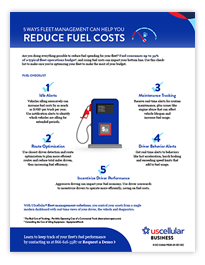Fight Rising Fuel Costs With Fleet Management
Fuel is expensive and it seems like there’s no end in sight to the level it might rise.1 In mid June a gallon of diesel fuel averaged $5.775 compared to $3.216 a year ago while regular gas per gallon cost $5.016 compared to $3.080 last June.2 Transportation, construction, field services and other organizations that rely on work vehicles are feeling an especially big pain in the pump.
Since fuel can represent as much as 39% of a company’s operating budget3, managing fuel costs is vital. Fleet management solutions can help tackle rising fuel prices by reducing idling times, better predicting fuel consumption, and improving driver behaviors (and safety).
Idling Away the Fuel
Preserving fuel in a fleet that might consist of dozens of foremen in pickup trucks, surveyors in sedans and site workers operating big rigs can lead to thousands of dollars in saving—especially in times of record-high prices for gas and diesel.
But drivers and operators don’t want to give up their comfort in lieu of company savings. Like anyone, they want to be warm in the winter and cool in the summer. So they might eat their lunch while idling in a vehicle running heat or air conditioning, which can cost an additional $9.90 to $96.72 per hour depending on the truck—or $5K to $76K per year4. Altering driver behavior to reduce idling can lead to significant savings.
For example:
An HVAC company in eastern Iowa discovered that employees sat for long periods of time with the truck engine still running. The owners used data delivered by fleet management to make simple adjustments in driver habit and save up to 600 gallons of fuel in one year for a fleet of 25 vehicles. Using current prices, this equates to a reduction of more than $3,000 per year.
Meanwhile, an electric company in Iowa installed tracking devices on their vehicles to monitor maintenance issues, gas usage and location. Before they installed a fleet management solution, they spent nearly $6,000 per month on gas. The first month after implementation, the number dropped by $1,200 — and continued to fall by another $100 per technician for the next several months.
Controlling and Forecasting Fuel Consumption
Fleet management solutions like those offered by UScellular® partners Geotab, GPS Trackit and others offer visibility into fuel usage and critical engine issues that can burn extra fuel. Fuel cards used at selected fueling stations let a company control employee spending by setting limits around:
- Which stations drivers visit
- How often drivers fuel up
- What times of day fuel can be purchased
- How much fuel is pumped per visit
Many fleet management systems integrate with fuel cards to decrease wasted fuel, put a hold on stolen fuel cards, approve or decline fuel transactions, and prevent abuse of resources.
Improving Driver Behaviors (and Safety)
Fleet management with GPS tracking platforms will also report on bad driving habits like excessive speed, acceleration or braking that can unnecessarily burn fuel. In-vehicle trackers can report on daily fuel usage compared to distance travelled, tell you how long a driver spends in an area and if they go off-route, and regulate where drivers fuel up. This data can enhance fuel savings.
Fleet management solutions can integrate with your fuel cards allowing you to set notifications to proactively manage speeding and idling, and track:5
- Fuel consumption (when driving and idling)
- Fuel economy
- Fuel level
- True idling
- Engine faults
Instead of relying on technicians to provide notification of any issues, the fleet manager can now simply schedule a recurring vehicle maintenance report to see them firsthand. This way, he can proactively schedule oil changes and other routine maintenance requirements before the technicians even realize they’re needed. The solution can eliminate the risk of large costs associated with preventable problems.
In fact, the team at a Wisconsin contracting company uses GPS tracking in its fleet to dispatch a vehicle when they need to track down shared equipment to complete a job — allowing the company to get more work done with greater efficiency.
UScellular provides multiple solutions like Geotab and GPS Trackit and more to tailor fleet management and GPS tracking solutions to your specific business needs. Speak with your local UScellular fleet management expert to discuss how your business can reduce fuel costs. Visit Fleet Management or phone 866-616-5587.
Fuel Checklist: 5 Ways Fleet Management Can Help You Reduce Fuel Costs
Download now
See if you’re prepared.
Learn more about fleet management.
Solutions Guide
References
- Gas prices hover near record high pushing stocks to biggest loss in over a year (USA Today)
- National Average Gas Prices (AAA)
- The Real Cost of Trucking – Per Mile Operating Cost of a Commercial Truck (The Trucker Report)
- Controlling the Cost of Idling Equipment (Equipment Watch)
- How Truck Fleets Save on Gas Prices (Global Tracking Communications)








